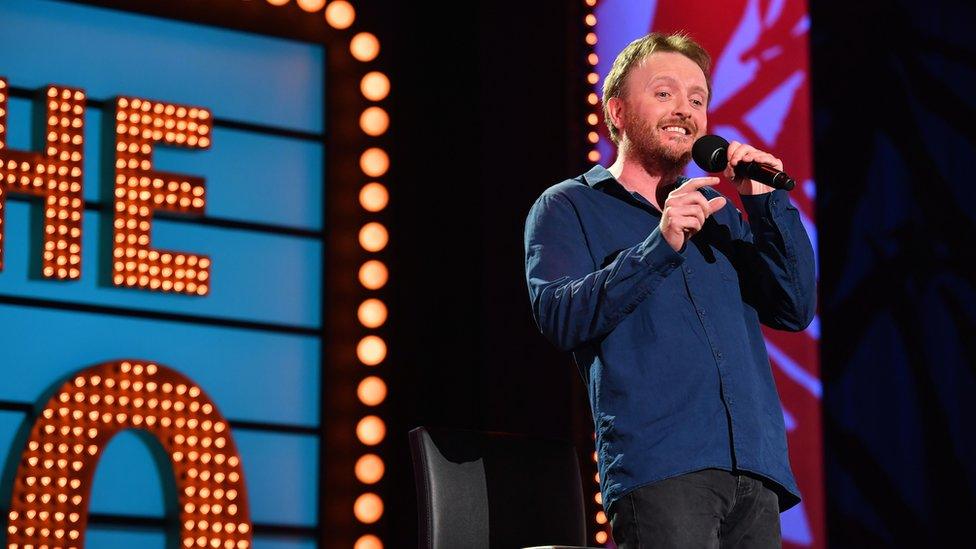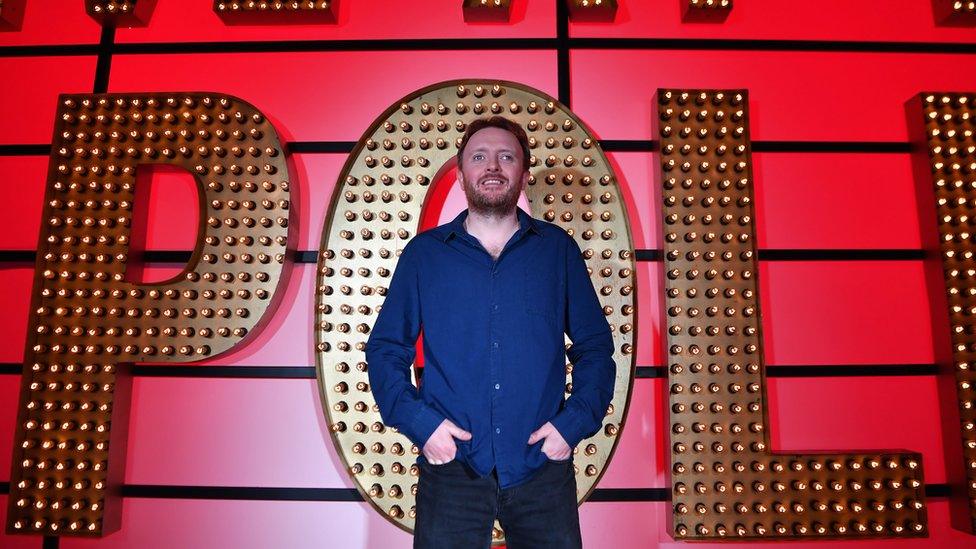The comedian who can't look at his audience
- Published
Comedian Chris McCausland talks about being blind ahead of his debut at the Apollo.
Comedian Chris McCausland makes his debut on the "Holy Grail" of TV comedy programmes Live at the Apollo early next year , but he hadn't planned on becoming a comedian at all. It was only after he went blind as a teenager, and then lost his job years later due to depression, that he turned to jokes.
McCausland, 40, was born with a hereditary eye disease that left him blind in his late teens.
"I was losing my sight all the way through childhood," he says. "I could never read the letters on the blackboard or anything at school, but I could run around and play football."
His sight loss was gradual and hard to cope with, but as the world got blurrier there was never a right time to process what had happened.
"I was very self-conscious. I hated using a [white] stick and I resisted it 'til the very last minute because it labelled me as being blind or disabled, which I was, but it was still quite new. I was very slow on the coming to terms with it."
McCausland's sight got so bad in his 20s that he was forced to give up his job as a website designer and became unemployed.
"I was a little bit depressed then and a mate of mine ran a pub. So I ended up going down to his pub quite a lot and maybe drinking a little bit more than I should," he says.
"Then I got a job in a call centre for a few years just doing sales which I think sorted me out."
While there, McCausland started to take an interest in the comedy scene and searched the web to see how he might get into it.
"I came across a thing that said you could be a comedian in two weeks and I thought 'behave - nobody could do that'."
But he gave it a go and "dared" himself to write five minutes of material and perform it at an open mic night to see if he really was funny.
"I didn't set the world alight but people laughed more than once - enough to make me have another go," he says.

McCausland quit telesales shortly afterwards to concentrate on his new-found talent, but it took a further two years before the hobby began to pay.
Initially his family were sceptical and told him to "get a proper job", but he was determined to succeed. He honed his routine performing five nights a week on the open-mic circuit - sometimes he would have up to four or five gigs a night, a number which creates its own original challenges.
"It can play tricks on your mind because you get to a point where you ask yourself 'have I told them this or was it the last show I did 40 minutes ago?'"
As McCausland travels the circuit so do his two sighted guides.
They accompanied him to the month-long Edinburgh Fringe Festival where they helped him get around the city.
"It's a long old slog for them to be sitting through the same show for a month." So he tends to switch them halfway through.
As well as getting McCausland to his shows, his guide for that day helps him on to the stage at each venue - where the comedian always has a stool to sit on or stand beside. It doubles as a helpful point of reference when he gets up and moves around.
"If I didn't have a stool," he says, "half of my brain would be thinking 'which way have I turned?'."
McCausland can't walk into the audience like his fellow comedians, and has to memorise his script thoroughly before a show.
"Other comedians have more flexibility and more mental freedom. They can be loose with what they have written. He says they don't need to concentrate so hard or cram it all into their heads like he does, because they can look at notes.
And though he has to approach his comedy a little differently, McCausland does not talk much about sight loss in his set.
"It's a part of what makes me 'me'. And I've mentioned it a little bit and made some jokes about it, but the idea is to get it out of the way and move on."
Most of McCausland's jokes centre around life in general and he guesses that only "about 15%" of his set is made up of "blind jokes".
"You don't want to keep on mentioning being blind because it stops being funny - if you are just talking about that, people are going to get bored of it."
But being a comedian is not the only job McCausland has to juggle.
He has a young daughter and says it can be a challenge to be a dad when you can't see.
Sophie has not inherited his condition retinitis pigmentosa, she has full sight and lots of energy.
"Half of the time she will run into the living room shouting 'look at me', and I have to encourage her not knowing whether she is holding scissors in her hand or got a carrier bag on her head."
Implying that he must be doing OK, he quips that she is four now and he has managed to keep her alive this far.
Communicating visually is important to young children who have not yet got the words to express themselves but the two have developed a system now she is beginning to understand that her dad cannot see.
"If she wants to show me the bows on her dress she will put my hand on the bows and she says 'look at these bows Daddy' - it's cute.
"As she gets older we will be able to go out together, because I'll hold her hand and she won't be as reliant on my ability to not walk her into a lamppost."

McCausland will be appearing on the new series of Live at the Apollo early in 2018.
He describes the moment he was offered the gig during a meeting at the BBC as the "highlight of his career".
"I did a little dance and went and had a beer with my agent," he reveals.
Though the name of the programme might suggest otherwise, the series was recorded earlier this year - and so McCausland has already performed the set in front of a 3,500-strong audience at the famous venue.
He had one chance to get it right which he describes as nerve-racking.
"You don't really want your first time standing in front of that many people to be filmed for everyone to see, because you just look like a rabbit in the headlights. But the whole experience was amazing, it couldn't have gone better," he says.
"It's the Holy Grail of opportunity - hopefully when they edit it and put it on the television it will look alright."
You can watch Chris McCausland on BBC Two's Live at the Apollo on 4 January 2018 at 22:00.

For more Disability News, follow BBC Ouch on Twitter, external and Facebook, external, and subscribe to the weekly podcast. You can also get in touch with the team by email, external.